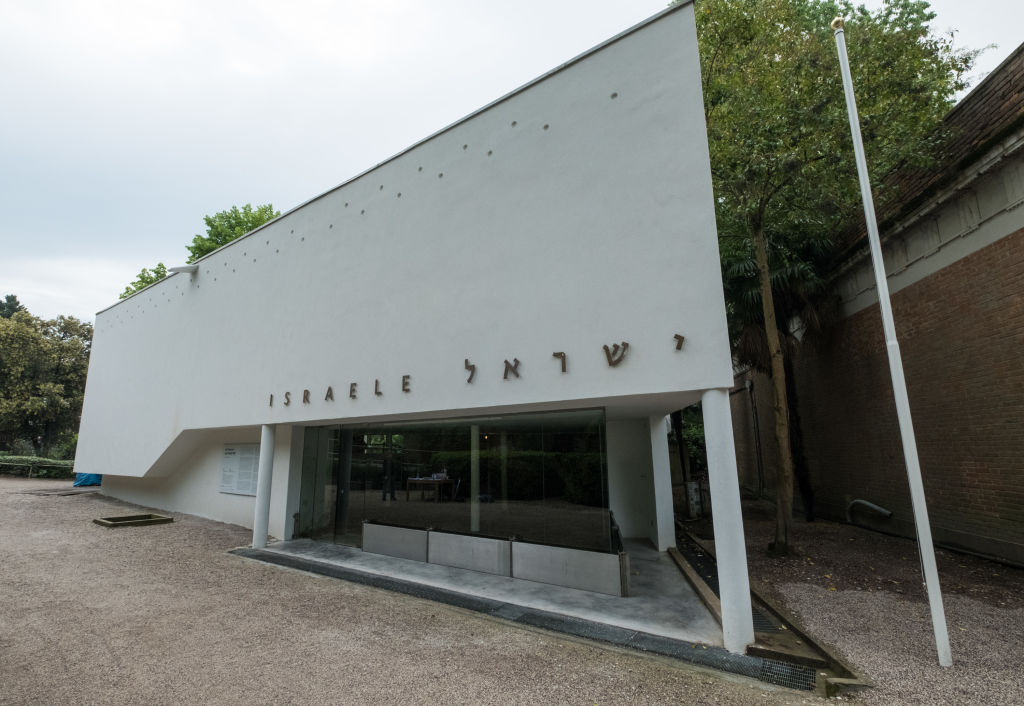
The Venice Biennale, often dubbed the “Olympics of the art world” for its long tradition of showcasing talent from across the globe, opens its 60th International Art Exhibition on April 20—but not without controversy: more than 8,700 artists and cultural workers have demanded that Israel be excluded from taking part in the world’s biggest art event over its deadly bombardment of the Gaza Strip.
The group, which goes by the Art Not Genocide Alliance (ANGA), published an open letter on Monday against Israel’s participation at the Biennale. It includes signatories who have participated in past Biennales or are slated to participate in the current one.
“Any official representation of Israel on the international cultural stage is an endorsement of its policies and of the genocide in Gaza,” the petition states. “The Biennale is platforming a genocidal apartheid state.”
Israel has a national pavilion in the Giardini, the parkland where the biennial art festival is held, as do 28 other countries.
The petition alleges a “double standard” when it comes to Israel’s permitted participation at the Biennale, pointing to how the organization sidelined South Africa during its apartheid regime as well as Russia in 2022 after its invasion of Ukraine.
The Biennale did not immediately respond to questions about the petition from TIME.
Read More: U.S. Serviceman Dies After Setting Self on Fire Outside Israeli Embassy to Protest War in Gaza
Israel will be represented at the Venice Biennale by artist Ruth Patir, and her exhibition will be curated by Mira Lapidot and Tamar Margalit. In the aftermath of the Oct. 7 attacks from Hamas and the Israeli onslaught that followed, Patir and the curators told ARTnews in a statement that they thought of how to “move forward” following the “initial state of shock and despair that left us paralyzed.” They added that “there has to be a pocket for art, for free expression and creation, amidst everything that’s happening. This is the very thing that gives us hope these days. It’s also the very humanist values that we are fighting for; otherwise, we might as well contend that the extremists have won.”
But the ANGA petitioners disagreed, calling the statement “simplistic” and insisting, “Art does not happen in a vacuum.”
“While the Israeli pavilion presses ahead, the genocidal death toll in Gaza and the West Bank increases daily,” the petition read. “While Israel’s curatorial team plans their ‘Fertility Pavilion’ reflecting on contemporary motherhood, Israel has murdered more than 12,000 children and destroyed access to reproductive care and medical facilities.” (Latest figures from the Hamas-led Gaza Ministry of Health estimate some 30,000 people have died in the Palestinian enclave since Oct. 7.)
The theme of this year’s Biennale is “Foreigners Everywhere.” Curator Adriano Pedrosa says that the backdrop for this year’s exhibit is “a world rife with multiple crises concerning the movement and existence of people across countries, nations, territories and borders, which reflect the perils and pitfalls of language, translation and ethnicity, expressing differences and disparities conditioned by identity, nationality, race, gender, sexuality, wealth, and freedom.”
Palestinians have no national pavilion, but they are represented in the Biennale’s official collateral events this year by a project from a collective co-founded by Hebron-based Palestinian activist Issa Amro and Berlin-based South African photographer Adam Broomberg—who is also a signatory of the petition.
Meanwhile, another exhibition was put forward by the Connecticut-based Palestine Museum U.S., which would feature the work of 24 Palestinian artists. Biennale rejected its proposal to be an official collateral event, but the show will be displayed simultaneously as an unofficial collateral exhibit hosted by Venice’s Palazzo Mora.
More Must-Reads from TIME
- Cybersecurity Experts Are Sounding the Alarm on DOGE
- Meet the 2025 Women of the Year
- The Harsh Truth About Disability Inclusion
- Why Do More Young Adults Have Cancer?
- Colman Domingo Leads With Radical Love
- How to Get Better at Doing Things Alone
- Michelle Zauner Stares Down the Darkness
Contact us at letters@time.com